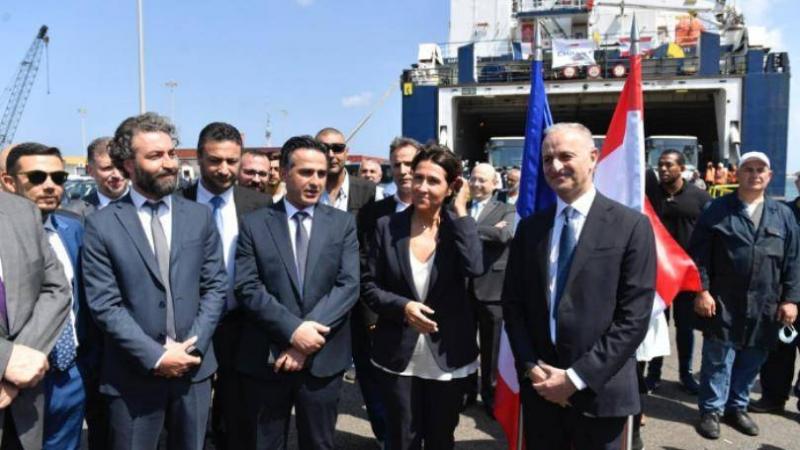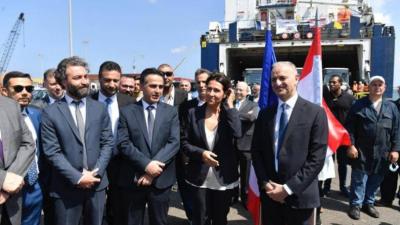Minister of Public Works and Transport in the caretaker government, Ali Hamieh, confirmed during his receipt of the first batch of buses donated by the French government at the Port of Beirut, in the presence of French Ambassador Anne Grillo and the General Director of "CMA - CGM" Lebanon, Joe Daqaq, that a new legal framework for public transportation in Lebanon will be prepared, where the state will be the regulator and the private sector will be the operator. He emphasized that "our main goal is to activate public facilities, and Lebanon is neither unable nor poor nor bankrupt, but is suffering from a severe financial and economic crisis due to financial policies that have persisted for 30 years." He announced that "revenues from the Port of Beirut and Rafic Hariri International Airport have increased without affecting the pockets of citizens." He called on "all countries of the world, except for the Israeli enemy, to assist Lebanon unconditionally, as France has done," thanking "the French government, President Emmanuel Macron," and the ambassador for this initiative.
Initially, Daqaq stated, "In support of the Lebanese, CMA CGM has provided the transportation of 50 buses donated by the French government to Lebanon, relying on its expertise in shipping and logistics to complete this operation, which was done in partnership with the French government." He pointed out that "the arrival of these buses will facilitate daily transportation for Lebanese citizens and create job opportunities for drivers. The group, which is committed to its Lebanese roots, is fully dedicated to supporting its homeland."
He noted that "two Lebanese sailors have recently joined the CMA CGM Aknoul crew to train Lebanese workers within the company’s fleet of about 600 ships." He mentioned that "the number of Lebanese employees in the company has risen from 250 to 1500, and what the company has done today is part of a series of operations the group has undertaken in response to the urgent needs of the country."
He indicated that "the partnership has decided with the French government to carry out this operation in the interest of the Lebanese people, to contribute to revitalizing the purchasing power of Lebanese citizens by ensuring access to appropriate public services for all citizens and to create numerous job opportunities for bus drivers."
He added that "CMA CGM recently offered to repair 45 local buses that were severely damaged in the Beirut Port explosion, trusting that this action will improve the daily lives of a large segment of the population in various regions. The group is also committed to supporting Lebanese youth and has always stood by Lebanon and its people."
He concluded by affirming that "CMA CGM is attached to its Lebanese roots and believes in Lebanon's future. It will not hesitate to play a leading role in the economic reconstruction of the country, having always been present alongside the Lebanese people through various humanitarian and social activities, in addition to expanding its business across sea, land, and air, as well as in logistics services."
For her part, the French ambassador stated: "These buses will facilitate transportation to work, schools, and hospitals, especially amidst the acute crisis that Lebanon is experiencing and rising fuel prices, as well as in the absence of public transport. For all these reasons, the French government decided to offer a donation of 50 buses for the benefit of the Lebanese state, which arrived today at the Port of Beirut," adding that "this is an initiative aimed at improving the daily lives of the Lebanese people."
She addressed the Lebanese, emphasizing that "this donation is a continuous support from President Macron to Lebanon and is also the result of extraordinary joint cooperation between the French government and some companies in France."
She thanked "the French parties who contributed to providing the buses and their spare parts, in addition to CMA CGM and its chairman, Rodolphe Saadé, who took it upon himself to transport them to Lebanon at his own expense, as well as covering the costs of repairing the 45 buses owned by the Lebanese state."
She clarified that "this French initiative is a temporary solution to confront the difficulties in Lebanon and is not a permanent solution," indicating that she "discussed with Minister Hamieh the issue of public transport, in addition to other areas," and stated that the donation cannot replace structural steps in the transport sector that would contribute to Lebanon's recovery, affirming, "Assistance will be provided for two years until the Ministry of Public Works and Transport can reach a comprehensive plan for all of Lebanon, and this assistance will begin today with a team of French experts who will work with a team from the ministry and the railways and public transport authority to start building this strategy, which includes defining transport routes, maintenance, employment, training, etc., so that the Lebanese have a solid foundation in the transport sector."
She expressed her happiness with France providing this donation, thanking Minister Hamieh, his team, and the port team "for the collaborative effort made by all."
For his part, Minister Hamieh confirmed that "the primary concern of the Ministry of Public Works and Transport is to enhance the role of the public transport sector in both the public and private sectors," noting that "starting next week, in cooperation with the French government, we will begin preparing a new legal framework for transport in Lebanon, where the state will be the regulator and the private sector the operator, as there is no escaping the importance of enhancing the private sector in Lebanon."
He added: "Our work at the ministry over the past eight months has shown us, contrary to the pessimists and those who lack confidence in Lebanon, that through our experiences on the ground, it confirms to them that our country is not unable, not bankrupt, and not poor; it suffers from a very severe financial and economic crisis like it has never seen before, in addition to the financial policies that have been followed for 30 years, and we are paying the price today. Our primary goal is to activate public facilities, which we have committed to from day one."
He announced that "revenues from the Port of Beirut and Rafic Hariri International Airport – Beirut have increased, without affecting the pockets of citizens," and that there have been no flooding on the roads nor disruption of connections even in heavy snow." He stressed that "public transport is a pivotal step for us, given what this sector has suffered from state neglect for 30 years," considering that "the primary concern was to develop the revenue tables No. 9 concerning the port and airport in the 2022 budget, which would increase state revenues."
He noted that "the undertaking of reforms is supported by the French government," pointing out that "Lebanon's renaissance can only be achieved through it, and it is not a response to external impositions but rather our conviction that it is the way forward for Lebanon, in addition to the application of the law under the roof of national sovereignty."
He asserted, "We are not against the recovery plan and did not object to it; our objection is simply in regard to the concerns we have about the depositors' funds, especially since the plan has not accounted for their funds in figures, nor in the issue of banks and what standards will be adopted by the Lebanese to resolve the banks, and this was not clear in the plan." He questioned, "If some are resolved, what happens to the depositors' funds there?" reiterating that "our objection to the plan was not from a place of malice or opposition but rather out of concern to bolster the recovery plan."
He called on "all countries of the world, except for the Israeli enemy, to assist Lebanon unconditionally under the roof of national sovereignty, as France has done, which will help us prepare specifications and a new legal framework regulating the relationship between the public and private sectors regarding transport," considering that "assistance should not only be about food but also about developing production sectors so that Lebanon can rise again."
He indicated that "the number of buses has become 95 owned by the state," reiterating that the public sector is not interested in competing with the private sector, and the buses will be distributed a third in Greater Beirut and two-thirds from Beirut to the north, south, and Bekaa. In the last cabinet session, the decision was made to give the public railways and transport authority the right to contract with the private sector through a transparent tender in front of everyone to operate the buses that remain the property of the state," noting that "there are more than 6000 public bus plates, in addition to more than 33000 public car plates."
He added: "Therefore, we need to establish a new legal framework in which the state is the regulator and the private sector is the operator. As for the fare, it should not exceed the cost of daily transport back and forth."
He continued: "I would like to say in front of the French ambassador that we are in the process of establishing a fund to support public transport, and its revenues will be provided through international donations, maintenance fees on trucks crossing international roads, and penalties for accidents causing damage to public property, without affecting the pockets of the citizens, but rather for the citizens' benefit."
He thanked President Emmanuel Macron, the French government, and the French ambassador for "this initiative, as well as CMA CGM for repairing the 45 buses and transporting the 50 buses from France to Lebanon today."




